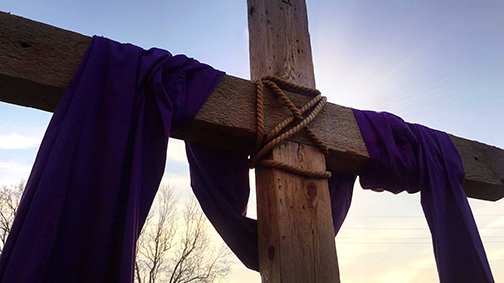Dear Friends,
As I mentioned in the Ash Wednesday homily, the world this year is giving us a very clear demonstration of the consequences of evil actions. All we have to do is look on our phones or our televisions to see the consequences of evil in the invasion of Ukraine by Russian forces. We see suffering, fear, destruction, loss and death. Innocent people are being hurt. To top it off, Putin has returned the world to the Cold War of my youth where the destruction of the entire world was a possibility.
Last Sunday, Pope Francis said, “Those who wage war forget humanity. They do not start from the people, they do not look at the real life of people, but place partisan interests and power before all else. They trust in the diabolical and perverse logic of weapons, which is the furthest from the logic of God. And they distance themselves from ordinary people, who want peace, and who – the ordinary people – are the real victims in every conflict, who pay for the follies of war with their own skin. I think of the elderly, of those who seek refuge in these times, of mothers fleeing with their children… They are brothers and sisters for whom it is urgent to open humanitarian corridors, and who must be welcomed. With a heart broken by what is happening in Ukraine – and let us not forget the wars in other parts of the world, such as Yemen, Syria, Ethiopia… – I repeat: put down your weapons! God is with the peacemakers, not with those who use violence.”
These consequences of evil remind us all to work to remove sin from our lives because of the harm it causes. As the long Christian tradition has taught us, sin distorts our character, it corrupts our human capacity, so what was meant to yield goodness is used to attack another. It is bad enough that we offend others involuntarily by insensitivity or self-centeredness, but sin is when we willfully hurt others, when we do it on purpose. Sin is the main human trouble. It lies at the root of loneliness, shame, meaninglessness and estrangement. Sin both causes and results from misery. Above all, sin disrupts the vital human connection with God. Not because of what God has done, but what we have done to move ourselves away from the divine. We run from the beauty that God has called us to be.
The moral theologian Cornelius Plantinga teaches, “The webbing together of God, humans, and all creation in justice, fulfillment and delight is what the Hebrew prophets call shalom. We call it peace, but it means far more than mere peace of mind or a cease-fire between enemies. In the Bible, shalom means universal flourishing, wholeness and delight – a rich state of affairs in which natural needs are satisfied and natural gifts fruitfully employed, a state of affairs that inspires joyful wonder as its Creator and Savior opens doors and welcomes the creatures in whom he delights. Shalom, in other words, is the way things ought to be…sin is the culpable disturbance of shalom…sin offends God not only because it bereaves or assaults God directly, but also because it bereaves and assaults what God has made. Sexism and racism, for example, show contempt both for various human persons and also for the mind of God. God savors and wants not only humankind but also human kinds. In the cramped precincts of their little worlds, sexists and racists disdain such differences in kind. Shalom is God’s design for creation and redemption; sin is blamable human vandalism of these great realities and therefore an affront to the architect and builder.”
I like that definition. Perhaps, at the beginning of our Lenten journey, we could examine where we are messing up God’s design. Ask God to help you to see sin in yourself and to give you the power of God’s Sprit to not only see it but to remove sin from your life. Our goal as disciples of Jesus is to become like Jesus. Just like Jesus in today’s Gospel, we will still be tempted, always, but like him we should be able to turn away from the sin. Please remember to pray for the people of Ukraine.
Peace,
Fr. Damian



